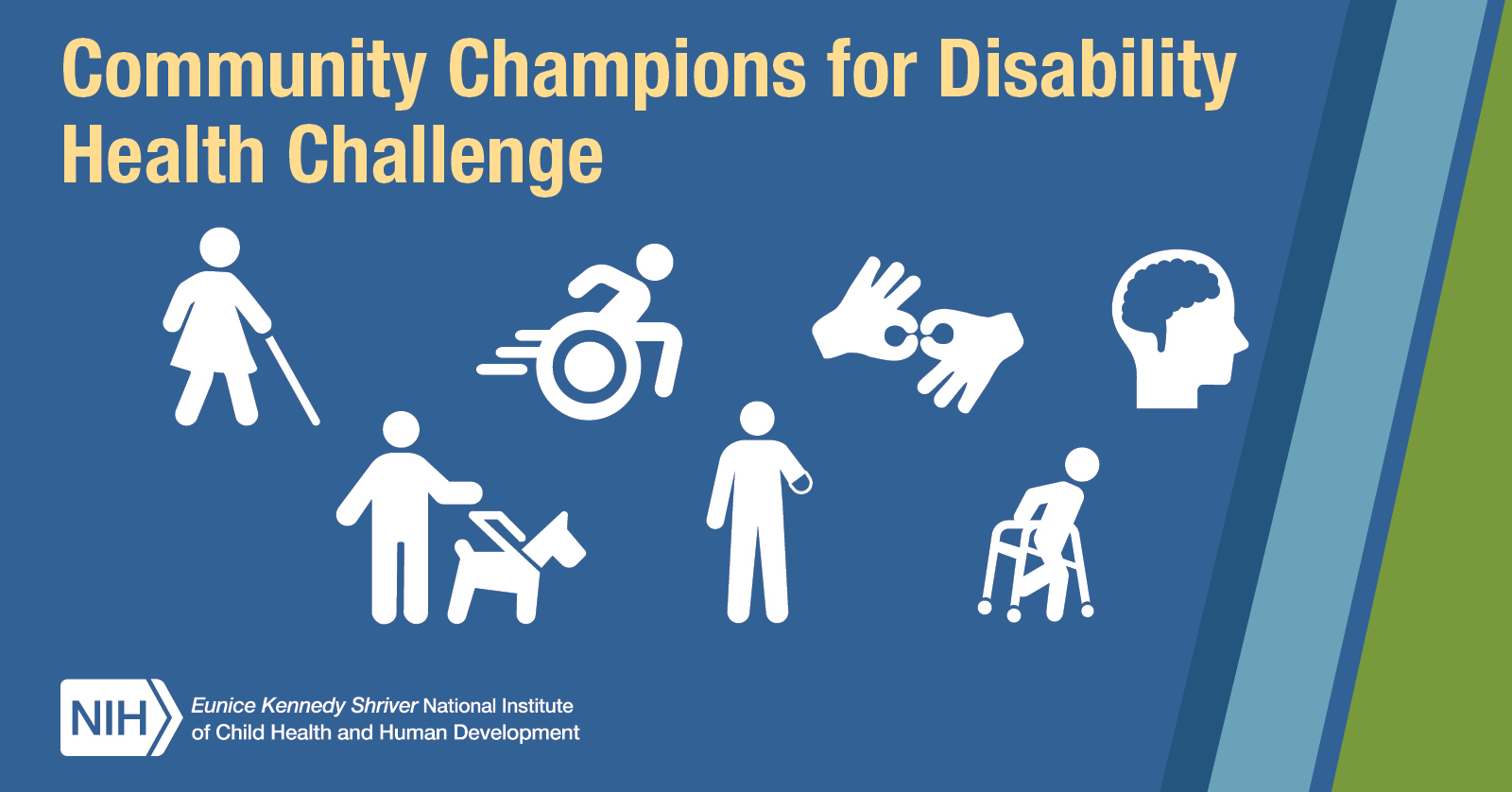
NIH’s Eunice Kennedy Shriver National Institute of Child Health and Human Development (NICHD) has announced the winners of the first phase of its Community Champions for Disability Health Challenge. This $485,000 prize competition, led by NICHD’s National Center for Medical Rehabilitation Research, encourages community-based organizations to develop and implement strategies to reduce health disparities experienced by people with disabilities.
More than 70 million people in the United States have at least one disability. People with disabilities often face barriers to accessing health care, including inaccessible medical facilities and equipment, lack of transportation to medical appointments, and communication barriers with health care providers. They also are more likely than those without disabilities to experience chronic diseases such as obesity, diabetes, and cardiovascular disorders.
The Community Champions for Disability Health Challenge incentivizes nonprofit organizations to develop and implement creative ideas to promote healthy habits for people with disabilities, increase their access to health services and information, and lower barriers to promoting health. In the first phase of the challenge, organizations submitted proposals to reduce health disparities by improving, expanding, diversifying, or amplifying their current programs and offerings for people with disabilities.
Submissions were judged by an expert panel, and eight winners were selected. Each will be awarded a $25,000 prize and an invitation to participate in the second phase, in which organizations will have one year to implement their proposal and demonstrate how they have enhanced their services. NICHD expects to announce final winners in February 2026.
Phase 1 winners are listed in alphabetical order, along with their project titles and brief descriptions adapted from submission packages.
- Able South Carolina
Building Health Equity with Disability-Led Change
People with disabilities are underrepresented in health care professions, contributing to barriers to equitable care. This project seeks to create a disability-inclusive curriculum at the University of South Carolina College of Nursing and Lexington Medical Center to address gaps in health care education regarding disability competency. The team also will work with local hospital administrators to proactively address ableism, communication challenges, and physical accessibility barriers. - Autism Society of America
Inclusive Vaccine Access & Education
People with autism spectrum disorders may experience disparities in the delivery of routine health care due to sensory issues, communication challenges, stigma, and other factors. This project seeks to expand the organization’s Vaccine Education Initiative by providing sensory-friendly vaccine kits and accessible vaccination clinics. The team also strives to engage and educate families and caregivers on vaccine literacy. - Discalced, Inc. (DBA Mark Morris Dance Group)
Dance to Equity: Expanding Parkinson’s Access
This project strives to expand the use of dance to increase social participation and physical activity among people with Parkinson’s disease. By collaborating with Black, Hispanic, and Asian community groups in New York City, the team will diversify the music, dance, and language options in their free dance classes, making them more culturally accessible to minority populations. - Down Syndrome Association of Northeast Ohio
21 Smiles, Down Syndrome and Dental Education
Dental care is a major unmet need for children with Down syndrome. This project plans to address this disparity by educating dental students about the oral care of people with Down syndrome, recruiting self-advocates with Down syndrome to help develop and participate in educational videos, and providing parent education to expand the number of oral screenings provided to infants and children with Down syndrome. - Hermansky-Pudlak Syndrome (HPS) Network, Inc.
Driving HPS Care in Puerto Rico
People with HPS, a genetic syndrome with high prevalence in Puerto Rico, may experience legal blindness, bleeding disorders, kidney issues, and pulmonary fibrosis. They face significant challenges due to the scattered locations of health experts and educational opportunities. By addressing transportation barriers, this project seeks to improve access to health services for people with HPS living in Puerto Rico. The team also plans to establish a pilot virtual pulmonary rehabilitation program. - National Aphasia Synergy, Inc.
Aphasia Peer Befriending: Ending Social Isolation
Aphasia is a language disorder that affects a person’s ability to speak, listen, read, and write, which can contribute to depression and other poor health outcomes. This project seeks to expand the organization’s online-based, peer-to-peer support program nationally. Their structured program supports aphasia self-management and mental health while offering meaningful connections and social participation. - Split Second Foundation
Empowering Health & Wellness for Disabled Families
This project strives to expand the organization’s services to address the comprehensive needs of people with disabilities living in New Orleans. Following a recent move to a larger, more centrally located space, the organization plans to augment their programs addressing the physical, mental, social, emotional, and vocational needs of people with disabilities. They also seek to provide paid internships to high school students to promote careers in rehabilitation. - United Cerebral Palsy Association of Greater Cleveland, Inc.
Assistive Technology: Finding Your Voice
Access to augmentative and alternative communication (AAC) can provide independence and socialization for children with communication difficulties due to cerebral palsy or other developmental conditions. However, AAC can be prohibitively expensive, and a child often needs to try different types of AAC to find the best fit. This project seeks to expand the organization’s lending library of AAC materials and increase referrals from their speech-language pathologist partners to meet the requests of more children. They also seek to expand their online chat club for children who use AAC.
HeroX is supporting the design, implementation, and management of the challenge on behalf of NIH through a multi-award contract from the National Aeronautics and Space Administration. Additional funders of the challenge include the National Institute on Disability, Independent Living, and Rehabilitation Research, part of the Administration for Community Living, and the following NIH components: National Eye Institute; National Institute on Deafness and Other Communication Disorders; National Institute of Arthritis and Musculoskeletal and Skin Diseases; and Division of Program Coordination, Planning and Strategic Initiatives within the NIH Office of the Director.
 BACK TO TOP
BACK TO TOP